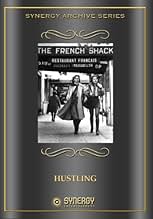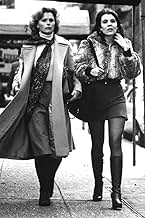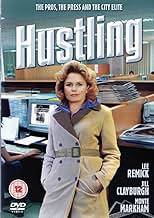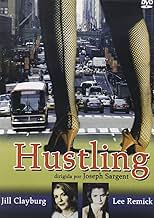Agrega una trama en tu idiomaDuring the 1970s, a NYC magazine reporter investigates to see who benefits financially the most from New York's prostitution industry.During the 1970s, a NYC magazine reporter investigates to see who benefits financially the most from New York's prostitution industry.During the 1970s, a NYC magazine reporter investigates to see who benefits financially the most from New York's prostitution industry.
- Nominado a 2 premios Primetime Emmy
- 3 nominaciones en total
- Business Suit
- (as Cliff Pellow)
- Bluejeans
- (as Stephan Nathan)
- Dirección
- Guionistas
- Todo el elenco y el equipo
- Producción, taquilla y más en IMDbPro
Opiniones destacadas
Far from being a bad actress, the beautiful Jill is simply wrong for the role, yet another example that casting is an "art form" that requires brains, something a bunch of film-makers lack. She might have been convincing as a Cincinnati hooker, or a Nevadan prostitute, but that Nu Yoyk accent makes her appear to be going for laughs. Sure, there are smaller elements of humour here too, but it is predominantly a social drama. If you manage to get past Jill doing that silly accent then you can believe her. I couldn't, at least not always.
How realistic is this film? For a TV drama it's realistic, but if you'd compare it to "Serpico", for example, or "Working Girls" (not to be confused with that dumb Griffiths film), then perhaps it isn't particularly.
What I like about it is that the writers made an effort to get acquainted with the NY street scene, rather than just make up an obviously artificial world of prostitution as happens so often on the small and big screens, which would completely defeat the purpose. The ins-and-outs of 70s NY Hookerlandia are pretty well covered.
Another plus is that the outdoor scenes were shot in the 70s, on location, a year before "Taxi Driver" came out. True, TD is much grittier, not to mention stylistically brilliant, but both movies give you the "old NYC" in similar ways: the one that punks, pimps, muggers, hipsters, lunatics and liberals still long for, still weep over, because they claim "it was better that way".
Yeah, it was better: but only for "hip" observers, tourists-with-bodyguards, millionaires hidden away in limos, and others wealthy enough to waltz through those areas safe and protected from the reality of such surroundings. They didn't have to live there. When I listen to the likes of Scorsese wax poetic about the "good old days" of muggings and pimps and hookers, I don't know whether to laugh or start a petition to get him locked up in a psychiatric ward. Ditto hipster punks, they too glamourize this era, as if hookers and muggings should be a mainstay of Manhattan life! Laughable. I understand the "romantic" appeal, it's not that I don't, but some people are also enamored with Nazi Germany, but without actually HOPING for a return to that era, without becoming Nazis. They are simply fascinated by that bizarre evil world without actually craving that ideology. Why can't Scorsese and the hipsters do the same?
Another positive is that the plot isn't over-dramatized. There aren't any ridiculous bombastic plot-twists to "create conflict", but things are kept low-key i.e. Mostly realistic, or as much as a TV movie can allow for.
What I didn't like is the stereotypical portrayal of the "idealistic" journalist, doing a story for all the right reasons. Lee Remick's character is pure fiction. American journalists (and journalists in general) are anything but idealist romantics: they are cynical, greedy, over-ambitious careerists who ruin lives at the drop of a hat. Their kind is only one rung above that of defense lawyers and politicians... (It's no coincidence that so many politicians stem from these two dark professions.)
So why criticism of her Flatbush dialect I'm not sure, but I know she was from a better part of NYNY. But hey opinions make the world go round.
The scenes are very 1975 so totally amazing to see, nice canvasses of Street life and soem beautiful touches of real people peering back at the camera as it trawls the streets. Oppressive police offices manned by jerks. Aesthetically I felt drawn completely into a compelling seedy and familiar underworld, even if the plot and script was a little watery at times. That's th problem they give Lee Remick I think.
The performance of JC was a taste of things to come, Remick was a little by her best, and all the seedy cops and fleabag hotel managers an pimps play fine roles and from the totally delicious across the decades Beverly Hope Atkinson brings some laughter to the scenes and she really put he stamp on those-when she was given lines to deliver-then in her 30s, still looking about 18. Total romp and immersion, ino a time lost, a very good movie.
¿Sabías que…?
- TriviaJill Clayburgh found out her agent at the time was actually pushing someone else for the role. She found another agent, got the role and received her first Emmy nomination.
- ErroresWhen Fran's article is finally published, closeup of magazine cover does not contain a price, date or any other information always found on cover.
- Citas
Fran Morrison: I just don't get it?
Keogh: Get what?
Fran Morrison: The whole logic of law enforcement. You don't arrest the pimps, you don't arrest the johns, you don't touch the owners of these fleabag hotels, but you're going to beat this monolith by busting Wanda and Dee Dee and forty other girls a night and tossing them in the bullpen. If you really wanted to stop illegal racetrack gambling would you put the racehorses in jail?
Keogh: [laughs] Whoever said anything about logic.
- ConexionesFeatured in The 27th Annual Primetime Emmy Awards (1975)
Selecciones populares
Detalles
- Fecha de lanzamiento
- País de origen
- Idioma
- También se conoce como
- Unterm Strich
- Locaciones de filmación
- Nueva York, Nueva York, Estados Unidos(main location)
- Productoras
- Ver más créditos de la compañía en IMDbPro



















